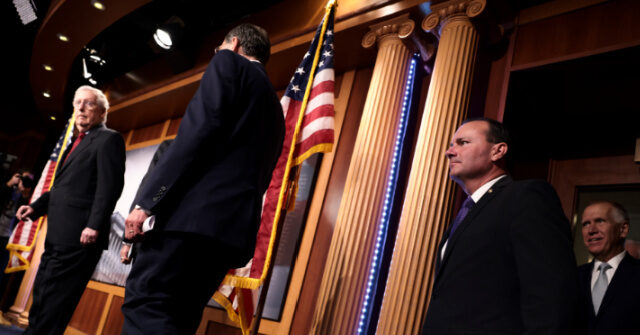On Tuesday night, Republican senators convened for a significant family meeting lasting over two hours to discuss potential successors to Sen. Mitch McConnell (R-KY). Organized by Sen. Mike Lee (R-UT), the forum featured three notable candidates vying for the leadership position: Sens. John Thune (R-SD), John Cornyn (R-TX), and Rick Scott (R-FL). Each candidate delivered opening remarks, followed by a Q&A session that allowed their colleagues to probe their visions for the Senate’s immediate and future directions. While none of the candidates elaborated on specifics after the session, the feedback from participating senators was overwhelmingly positive, underscoring the importance of such discussions in shaping party dynamics.
Sen. Ron Johnson (R-WI) highlighted the quality of discourse, noting that a new member expressed their excitement about engaging in productive conversation, contrasting it with less fruitful interactions in the past. Johnson publicly endorsed Scott ahead of the forum, showcasing the tacit alliances forming among the senators. During the candid discussions, multiple participants emphasized the necessity of fostering debate on the Senate floor and among Republican senators themselves. This collective dialogue aimed to lay the foundation for effective leadership capable of advancing President Donald Trump’s agenda, an imperative many senators emphasized during the forum.
Although many senators remained discreet about their preferences post-forum, a few were decisive in their support. Sen. Marsha Blackburn (R-TN) openly declared her support for Rick Scott, citing his energetic commitment to the Trump agenda as a crucial factor in her decision. Her endorsement highlighted a key concern for many Republicans: ensuring that the party’s leadership aligns closely with Trump’s priorities moving forward. Sen. Mike Lee also expressed support for Scott, characterizing the current juncture in the Senate as a pivotal moment necessitating bold reforms. Lee argued that Scott’s aggressive approach to reform and his consistent alignment with Trump’s agenda positioned him as a favorable choice.
In contrast, Sen. Mike Rounds (R-SD) expressed endorsement for his fellow South Dakotan, Thune, praising the performance of all candidates. Rounds asserted that the perceived differences among the candidates were minimal, ultimately revolving around their distinct leadership styles rather than significant ideological divides. This viewpoint reflects a broader sentiment among senators that regardless of the outcome, the next leader will need to effectively navigate the nuances of party dynamics within a divided Republican conference. The process is critical, as whoever replaces McConnell will likely influence Senate strategy and operations for many years to come.
The selection of the new Republican leader carries profound implications, not only for the future of Trump’s policies but also for the GOP’s overall direction and cohesion. Given McConnell’s tenure of 18 years, the upcoming decision has the potential to shape the party’s legislative priorities for the foreseeable future. As the Republican conference consists of 53 senators and senators-elect, the internal vote scheduled for Wednesday morning at 9:00 a.m. EST, conducted via secret ballot, just further illustrates the high stakes of this leadership change. To secure the leadership position, a candidate must garner at least 27 votes, indicating a potentially protracted decision-making process, with multiple ballots conceivable as opinions coalesce.
Ultimately, the outcome of this leadership election is not merely a matter of personnel; it embodies a critical turning point for the Republican Party. Each candidate brings a particular vision for the future, and their ability to unite senators around a shared agenda will play a pivotal role in shaping the effectiveness and direction of the party in a rapidly evolving political landscape. With the impending vote and significant endorsement movements emerging from the forum, all eyes are now on which candidate will rally sufficient support to take the reins from Mitch McConnell, determining not only the approach to Trump’s agenda but also the overarching strategy for the Republican Party in the coming years.

